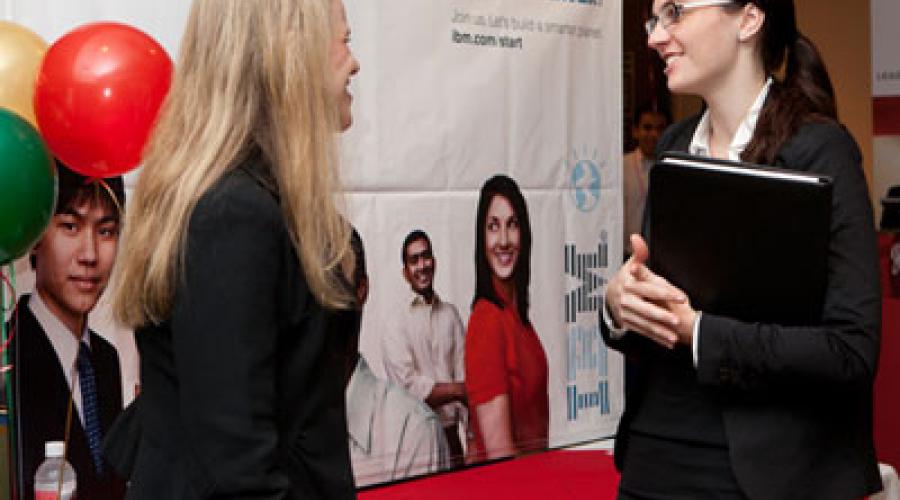
Competitive Edge
These days, corporate recruiters have to be more selective about the universities they visit.
Nickle LaMoreaux '01, vice president of human resources for IBM's consulting division and an IBM recruiter, says the ILR School remains a top choice.
As budgets become tighter, LaMoreaux explains: "We have to narrow the field and the number of places where we can recruit. There's no question that we'll always come back to ILR."
IBM is one of 32 employers who participated in last week's annual ILR Career Fair, says Regina Duffey Moravek, ILR director of career services. This included 66 representatives, and half of those were alumni.
"Our students are in high demand." Duffey Moravek says. "Employers tell us they want to keep returning for the career fair, since they can expect to meet students who are well prepared and high quality."
Another corporate representative at the fair, Saima Siddiqui MILR '11, a human resources leadership development professional with Johnson & Johnson, says that ILR graduates often have an edge because of their broad knowledge.
"I know that through the MILR program, I was exposed to areas outside of human resources," she said. This well-rounded, interdisciplinary approach gave her a strong foundation in human resources, but also an understanding of other functions in the workplace.
"Something that helped me at ILR was working in teams. In the workplace, you will be working with different people in different functions. That's our culture at Johnson & Johnson."
LaMoreaux says that, even in tough economic times, ILR students tend to do well because of their "curiosity, and their sense of cultural adaptability and how to be globally mobile. That's important at IBM since we have to work with people around the globe."
Christopher Collins, associate professor of human resource studies and director of the Center for Advanced Human Resource Studies (CAHRS), agrees that a global perspective and being exposed to diverse thinking are important to employers.
"In conversations with recruiters and senior HR executives, it's also my sense that organizations are looking for students that have some combination of business acumen, technical knowledge of HR, courage and a willingness to have difficult conversations, leadership potential, and an understanding of how to diagnose problems and drive change," Collins says.
What seems to help ILR students stand out is that they rate high on lots of these dimensions, he adds, based on their backgrounds before coming to the school and the classroom and experiential learning they get when they're here.
Both LaMoreaux and Siddiqui reinforce how critical it is for students to get practical experience through internships. The IBM and Johnson & Johnson internship programs are used to build talent pipelines, and interns typically go on to become full-time employees.
"Internships, study abroad and leadership positions will help you set yourself apart," LaMoreaux says. "Companies are looking for that."
While recruiters know that their time at the ILR Career Fair is well spent, students also see the value and get results.
Matthew Truesdail '13 says he's experienced direct benefit from attending the fair and talking with recruiters. After last year's event, he heard back from one of the recruiters in just a few weeks and was hired for a summer internship.
Lina Chang ILR '14, who plans to study abroad during her junior year, says the career fair is great because you get to meet people working in the field like Siddiqui who are "fresh out of college."
"They can provide a lot of insight, not just about jobs, but about classes you should take and other opportunities."


